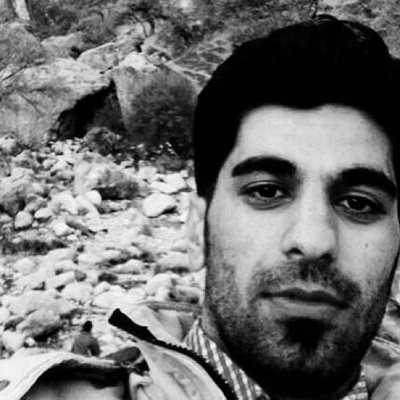
Last Update
Unknown
Organisation
Unknown
Gender
Male
Ethnic Group
Unknown
Religoius Group
Muslim
Province
Tehran
Occupation
Social Media Activist
Sentence
Five years in prison (currently released on bail)
Status
Released
Institution investigating
IRGC Intelligence
Charges
Conspiring against national security
Propaganda against the regime
Nima Keshvari Released
He was released on bail in August 2017, but later in the same month the Revolutionary Court sentenced him to five years in prison for propaganda against the regime and activities against national security. He is currently free on bail.
Between March 14-16th, 2017 the intelligence agents of the Revolutionary Guards (IRGC) arrested at least 12 reformist or pro-Rouhani administrators for Telegram channels, forced them to reveal their passwords and deleted the contents of the channels. They were accused of “security” offences and “spreading falsehoods, disturbing public peace, creating fear and anxiety among people and spreading immoral content and unlawful propaganda.”
A number of those arrested were released shortly after, but Nima Keshvari, the admin of a reformist and pro-Rouhani Telegram channel, and five others — Mojtaba Bagheri, Saeed Naghdi, Ali Ahmadnia, Javad Jamshidi, and Sobhan Jafari-Tash — remained in detention for a period of about five months, during most of which they had no access to a lawyer, which is in violation of Iranian law. In late July and August 2017, Keshvari and others were released after they each posted a bail of 500 million tomans (over $150,000).
During March 2017, in addition to the arrests of Telegram admins, a number of journalists were also arrested, including Ehsan Mazandarani, Morad Saghafi, Hengameh Shahidi, Tahereh Riahi and Zeinab Karimian. Many saw the arrests as part of an attempt by forces arrayed against President Hassan Rouhani to harm his chance for re-election, as the presidential election was approaching on May 19th. Besides triggering protests from human rights groups and supporters of free speech, it also led to open quarrels between pro- and anti-Rouhani camps and politicians.
On March 8th, Mahmoud Sadeghi, a representative from Tehran, wrote a letter to General Mohammad Ali Jafari, the commander-in-chief of the Revolutionary Guards, expressing deep concern about the arrests and reminding him that the general himself, in a speech on March 7th, had told his commanders: “Not a single member or commander of the Revolutionary Guards has the right to intervene [in the elections] by taking a political or factional side.”
Threatening to impeach Intelligence Minister
On March 15tb, Iranian parliament’s Deputy Speaker Ali Motahari threatened the Intelligence Minister Mahmoud Alavi with impeachment if the ministry could not thoroughly explain the motives behind the recent arrests. The timing of the arrests was also suspicious, he said, because of the approaching presidential election, making it even more urgent for an explanation to be provided. “The only accountable institution that is named in the constitution is the Intelligence Ministry,” he added, “and if others are interfering in their work, the Intelligence Ministry is still responsible.”
In response, on April 5th, Mahmoud Alavi told reporters that the government had not supported the arrest of Telegram admins, but gave no further details about whether it planned to take any action. Alavi’s announcement was seen as an exercise in public relations and subsequent events showed that no action was taken. It also demonstrated that the executive branch and even its Intelligence Minister are mostly bystanders when coping with repressive measures taken by the Iranian judiciary, which is controlled by hardliners and the Revolutionary Guards.
Telegram, with an estimated 20 million users, is one of the most popular messaging services in Iran. The rate of its adoption caught security agencies of the Islamic Republic somewhat by surprise, though they soon hastened to remedy the situation. Since January 2016, admins of Telegram channels with more than 5,000 members have been required to register the channels with the Ministry of Culture and Islamic Guidance. This has given the security agencies the ability to use the ministry’s database to identify and, if need be, apprehend the channel admins. All of those arrested in connection with Telegram activities were administrators of properly-registered channels.
Hunger Strike and Solitary Confinement
On June 9th 2017, the six jailed administrators went on a hunger strike in Evin Prison to protest against their prolonged detention without access to legal counsel. “Lawyers have come forward to defend them, but the prosecutor’s office and the judge have not allowed lawyers to see the prisoners according to a recommendation by the Revolutionary Guards,” an informed source told the Center for Human Rights in Iran (CHRI).
Judiciary Spokesman Gholam Hossein Mohseni Ejei denied that the jailed admins had gone on hunger strike. He also dismissed the claim that they had been denied the legal rights to which defendants are entitled. However, Keshvari was transferred to solitary confinement, his family was not allowed to visit him and he was not allowed to call them on the phone. Even his lawyer, Ali Mojtahedzadeh, was not allowed to visit him.
In late July and in August, the detained admins were able to leave Evin Prison after posting bail set at 500 million tomans, or over $150,000, each.
In late August, Branch 15 of the Revolutionary Court under Judge Abolghasem Salavati, a known violator of human rights, sentenced the six to terms ranging from two to five years in prison. Nima Keshvari and Ali Ahmadnia were both given five-year sentences. Their lawyer Ali Mojtahedzadeh was not allowed to reveal the specific charges for which they were convicted, but said that the verdict would be appealed.
Currently, Nima Keshvari remains free on bail until further developments.